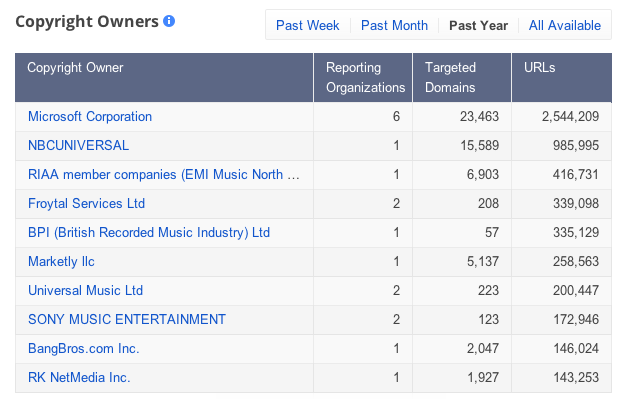Microsoft's piracy problem: Lock, stock and two Googley barrels

Amid a wave of legislative measures that came close to to crushing online file-sharers backed by copyright owners and entertainment companies, it would likely come as little surprise to see music, film and television studios featuring on the high-end of the list of those issuing takedown requests to search engines like Google.
But of all companies, Microsoft hit the number one spot of all companies asking Google to remove search results that could be used to download its products and software illegally.
Ergo, Microsoft does more to 'censor' the Web than most copyright holders put together.

Each year, Google releases a transparency report in efforts to open the doors to how the complex, dominant market figure conducts business. While government takedown requests have been noted in its annual reports, this year's report is the first time copyright-related notices have figured into the equation.
Microsoft stood at the top of the copyright owners' list by nearly five-times compared to the British Recorded Music Industry (BPI), NBC Universal, and the RIAA. The vast majority of sites targeted with file-sharing sites, link- or Magnet-link sharing sites such as The Pirate Bay, or file search engines that index known pirate sites for content, like FilesTube.
Google said there were more than 2.5 million takedown requests from Microsoft where it believed others' were violating its copyright.
Microsoft has suffered at the hands of pirates. With more than 90 percent of all PCs running Windows, and around 95 percent of the market using Office, Microsoft has set itself up to be a major target for illegal file-sharers.
Once was the emerging markets that sold pirate copies of physical Windows and Office media, the battle has slowly infiltrated the West through search results and file-sharing sites, for consumers simply unwilling to pay.
While films, television shows, music and other content will continue to be shared illegally, the content has to be viewed on something, leaving operating systems to be one of the most pirated bits of software on the Web.
Microsoft can only do so much in the global piracy battle. While the software giant continues to patch its software and add increasingly difficult mechanisms to fool file-sharers, Microsoft is often the one sent back with a bloody nose and licking its wounds after the pirates find yet another way to circumvent the security measures.
But nowadays the greatest weapon a downloader of illegally shared software is search. Microsoft can only ask Google to remove a search result because it's often all it can do in the fight-back challenge.
On an interesting note, Google said it took an average of 11 hours to respond to requests by companies to remove content --- sometimes faster, sometimes slower --- but warned that the takedown tool was often used for "abusive removal requests".
"For example, we recently rejected two requests from an organization representing a major entertainment company, asking us to remove a search result that linked to a major newspaper’s review of a TV show.
The requests mistakenly claimed copyright violations of the show, even though there was no infringing content. We’ve also seen baseless copyright removal requests being used for anticompetitive purposes, or to remove content unfavorable to a particular person or company from our search results."
Image credit: Google.
Related:
- Everybody pirates: RIAA, Homeland Security caught downloading torrents
- SOPA: Why the ‘broken web’ should stay broken
- Ed Bott: Confessions of a Windows 7 pirate
- Is UK retail giant Comet really a Windows pirate?
- CNET: Google tackles piracy by removing millions of URLs
- ZDNet: UK’s Pirate Bay blockade begins, but only ISPs must oblige